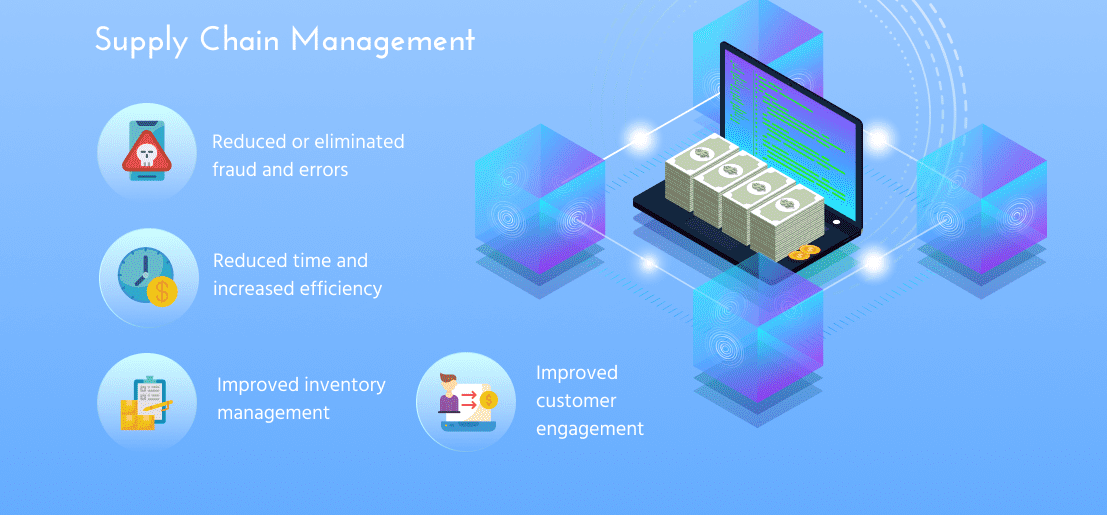Blockchain Use Cases: Benefits For Businesses
Blockchain use cases have gone far beyond the financial sector and cryptocurrency. In fact, forecasts suggest that spending on blockchain solutions will continue to grow in the coming years, reaching over almost $18 billion by 2024. The business value added by blockchain will surpass $176 billion by 2025 and $3.1 trillion by 2030. Such industries as insurance, healthcare are starting to use blockchain technology but it’s believed that blockchain could transform many more industries. Ultimately, there are virtually endless use cases for a transparent, verifiable transaction data register – particularly because blockchain operates through a decentralized platform that doesn’t require central control, making it resistant to fraud.
While many companies use blockchain to achieve greater transparency across the digital information ecosystem, few of us know how it will impact several industries apart from the financial sector.
This blog post aims to show you the main benefits of using blockchain applications for business, highlighting real-life use cases of the technology in different industries.
Advantages of Blockchain for Businesses
Blockchain can reduce the costs of the total amount by 2-3% and provide guaranteed, real-time transactions across borders. Businesses can get up to 25% improvement in customer experience due to faster processing and use of digital channels. And up to 40% increase in efficiency due to straight-through processing and a single source of truth. As well as 95% reduction in errors due to the elimination of out of sync ledgers and reconciliations. Here are the key advantages blockchain technology applications offer to various businesses:
Transparency. In a distributed ledger every transaction is recorded publicly. Public access allows everyone to verify the system working correctly.
Integrity. Everything is archived and authorized in a decentralized way and the system ensures that data is processed in a reliable and transparent way.
Immutability. A third-party cannot make any changes to the system.
Security. With no central point to be exploited, the system is protected against hacking attacks and fraud.
No Intermediaries. Peer-to-peer and business-to-business transactions are completed without the need to involve any 3d party.
Customer-oriented. Transparent solutions allow streamlining and automating communication with customers, enabling a higher level of trust.
Innovation. Blockchain introduces a completely new business model, providing valuable competitive advantages.
Top 10 Blockchain Use Cases by Industry
Below are top 10 business niches that use blockchain technology in their solutions and the benefits they get out of it.
1. Blockchain in Healthcare
If you wonder what can blockchain be used for in medicine, the answer is: “it is used to do miracles”. The truth is that there is no single industry that can benefit from blockchain as much as healthcare can do. The potential of the blockchain technology in healthcare covers but not limited to solutions aimed at:
- Improving drug supply chain
- Managing and accessing drug trial data for research purposes
- Clinical trial bookkeeping
- Finding the right people for the medical trial
- Consent management
- Filling up forms for hospital intake
- Credential verifications for physicians
- Secure data transfer
- Payment processing and interoperability
- Revenue cycle management;
- Improving medical adherence
- Medical history management and sharing
For more information please read our article on how blockchain technology is used in healthcare industry.
2. Blockchain in Banking & Finance
Introduced to a wide audience together with Bitcoin, blockchain remains linked to cryptocurrency by many even for now. But when it comes to using blockchain technology in banking, not everyone can name at least a couple of its real-life use cases. Meanwhile, apart from crypto-payments, there are numerous alternative use cases for blockchain, including those aimed at improving clearing and settlement procedures, remaking trade finance for the modern world, addressing shortcomings related to cross-border payments, complimenting anti-money laundering (AML) and know your customer (KYL) regulations.

Already offering dozens of effective solutions and many other upcoming in the near future, blockchain opportunities for banks look extremely promising. Banks can reduce their operational costs by 30% per year by introducing blockchain technology. So what are the main improvements blockchain brings to the banking sector? See them below:
- Interbank transactions
- Remittance
- Smart contract enforcement
- Crypro banking
- Record sharing&storage
- Regulatory technology
- Loan Syndication
- KYC/AMI
- Regulatory reporting
- Trade finance
- Increasing transparency
- Serving the unbanked
- Data security
3. Blockchain in Retail
Blockchain business applications address many challenges retailers are facing. Here are some examples of how to use blockchain in retail to enhance its processes and increase customer satisfaction.
- Establish a more transparent supply chain for the customer
- Offer payments with cryptocurrency
- Share browsing and purchase data with retailers to improve customer identity
- Improve the process of attaining tax refunds from retail purchases
- Reduce cyber hacks
4. Blockchain in Insurance
When it comes to insurance, there is no place for questions like “blockchain: what is it good for?”. Rapidly optimizing business processes by sharing data in a secure, transparent, and efficient manner, blockchain business applications revolutionize the industry, and here are some predictions on its future in insurance:

5. Blockchain for Real Estate
Blockchain applications can solve many problems real estate is facing, including severe lack of transparency and liquidity, high fees and pricing commitments, and low transaction speed. Having smart contracts and tokenization along with the technology’s key benefits on offer, blockchain current uses in real estate allow the democratization of the industry’s properties. Here are some uses of blockchain in real estate industry:
- Decentralizing MLS
- Tokenized Ownership
- Smart Contracts
- Preventing Title Fraud
- Crowdfunded Investing
- Preventing Wire Fraud
- Property Inspection Transparency
- Fighting Mortgage Fraud
- Title Transfer Transparency
6. Blockchain Government Use Cases
If you wonder what are the most practical blockchain applications, take a look at the public sector where the technology offers a huge promise to local elections. With blockchain, it is possible to bring elections to the next level, offering online voting, protecting countries from potential foreign intervention, allowing flag redundancies, and tying unique personal identifiers to individuals. There are even more practical use cases for blockchain in government and public sector. Some of them are mentioned below:
- National digital currencies
- Customs & border Patrol
- Transparent budgeting
- Secure data entry
- Voting
- Replacing paper-based systems
- Interagency data management
- Combating corruption
- Improving shared services models
7. Blockchain in the Automotive Industry
More blockchain real-life applications can be found in the automotive industry, where the technology can do real miracles, improving safety, convenience, and automating processes. Here are just a few examples of how to use blockchain in this sector:
- Smart vehicle delivered data
- Automated maintenance
- In-vehicle wallets
- Theft prevention
- Transparent vehicle history
- Rewarding safe driving
8. Blockchain in Energy Sector
With over a hundred of blockchain use cases identified for the energy sector, there is no doubt that someday the technology will change its face; hopefully, for the better. Illustration below shows how applications for blockchain technology in energy will influence the sector.

9. Blockchain in Logistics and Supply Chain Management
Whether it is the blockchain for small business or blockchain in the enterprise, the technology gives a promise for both. Already ensuring data protection by advanced encryption methods, allowing huge market players to stay anonymous and making secure payments, blockchain use in logistics and transportation industries will continue to grow.
Here are some examples of blockchain solutions for the logistics industry
- Goods tracking software
- Modified freight and transportation solutions
- Crypto-payment systems
- Fair cooperation software
Here are the benefits blockchain offers to the supply chain management:

10. Blockchain in Gambling
Gambling Industry is one of the spheres where trust and security are the top priority. That’s where blockchain technology saves the day. People do not trust online casinos and betting services, they believe that the system itself is programmed to eliminate the possibility of winning and to steal their money. Blockchain provides full transparency to the winners as well as eliminates fraud and ensures secure transactions. So the history of victories and payments is not only open but also well-protected and immutable. Here are some more benefits blockchain provides to gambling and betting industry:
- Improved Payout Process
- Cryptocurrency Availability
- Anonymity
- Reduced House Edge Costs
- Audience Expansion
Conclusion
Every single industry offers at least several uses for blockchain, and the technology does not let such occasions go without benefits it brings. While this blog post highlights just ten industries taking advantage of this innovation, there are many more behinds, with dozens of blockchain real-life applications waiting to become a reality.
With nearly two decades of providing banking & finance development services, including blockchain app development, we are always happy to combine our deep expertise in the sector with our passion for technology to deliver innovative solutions aimed at ensuring your business success. Considering incorporating Blockchain in your business application? Do not hesitate to contact us.












